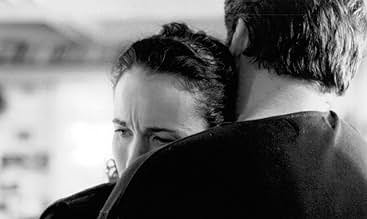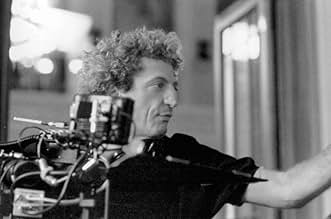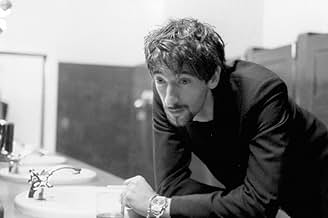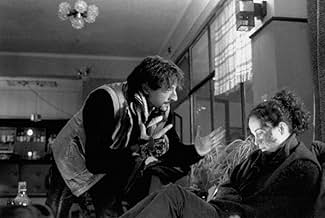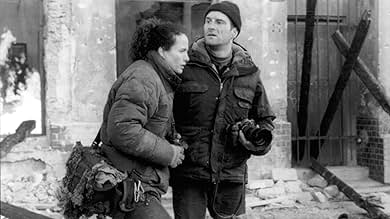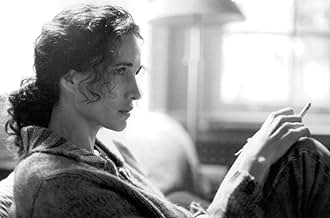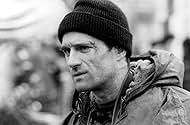IMDb रेटिंग
7.0/10
7 हज़ार
आपकी रेटिंग
अपनी भाषा में प्लॉट जोड़ेंWhen a Newsweek photojournalist disappears in war-torn Yugoslavia, his wife travels to Europe to find him.When a Newsweek photojournalist disappears in war-torn Yugoslavia, his wife travels to Europe to find him.When a Newsweek photojournalist disappears in war-torn Yugoslavia, his wife travels to Europe to find him.
- पुरस्कार
- 3 जीत और कुल 1 नामांकन
Scott Anton
- Cesar Lloyd
- (as Scott Michael Anton)
फ़ीचर्ड समीक्षाएं
An emotional film about a woman's search for her husband, shown through events that really happened in the Croatian city of Vukovar.
The city of Vukovar was destroyed by the JNA (Yugoslav People's Army) and Serb paramilitaries. Unfortunately, that really happened in 1991, and the hospital we see in the film really does exist, Serb paramilitaries pulled wounded Croatian civilians and soldiers out of it and killed most of them.
The massacre occurred shortly after Vukovar's capture by the JNA (Yugoslav People's Army ) and paramilitaries from neighboring Serbia. In that period, it was the fiercest battle in Europe since 1945, and Vukovar was the first major European city completely destroyed since World War II.
The film is really hard to watch, because the atrocities we see in the film, committed by Serbian paramilitaries and the JNA (Yugoslav People's Army), really happened in 1991.
The cast evoked the emotions and all the horrors of the war, the film is emotional, especially for those who survived the war.
The footage showing Serb paramilitaries entering the city and singing a truly disgusting song is faithfully reconstructed in the film and when you look at the actual footage from 1991, it is almost identical.
The cinematography is realistic and the directing is excellent. An emotional and impressive film.
The city of Vukovar was destroyed by the JNA (Yugoslav People's Army) and Serb paramilitaries. Unfortunately, that really happened in 1991, and the hospital we see in the film really does exist, Serb paramilitaries pulled wounded Croatian civilians and soldiers out of it and killed most of them.
The massacre occurred shortly after Vukovar's capture by the JNA (Yugoslav People's Army ) and paramilitaries from neighboring Serbia. In that period, it was the fiercest battle in Europe since 1945, and Vukovar was the first major European city completely destroyed since World War II.
The film is really hard to watch, because the atrocities we see in the film, committed by Serbian paramilitaries and the JNA (Yugoslav People's Army), really happened in 1991.
The cast evoked the emotions and all the horrors of the war, the film is emotional, especially for those who survived the war.
The footage showing Serb paramilitaries entering the city and singing a truly disgusting song is faithfully reconstructed in the film and when you look at the actual footage from 1991, it is almost identical.
The cinematography is realistic and the directing is excellent. An emotional and impressive film.
Thank goodness for Brendan Gleeson and Adrien Brody. Without their performances, this movie would have been a waste of time. I couldn't stand Andie MacDowell's character. She plays a totally stupid woman. Anyone with any sense would have contacted the Red Cross and other international agencies and asked them to look for her husband, but she foolishly marches into the middle of a civil war and risks the lives of her husband's colleagues because she is so deeply in love. Of course, it would have been a different movie if her character acted with any brains and maturity. At a time when her children needed her the most, she leaves them and almost gets killed herself. The audience is supposed to think this is wonderful because it is so romantic. Give me a break.
There are very, very few films that had dared to tackle the controversial subject of wars in the former Yugoslavia and get it right. This is one of them, and done extremely well. Now, if your knowledge on the subject is limited, you may have a hard time following the politics of it. However, you shouldn't let that prevent you from viewing it; because in its core, it's actually a very basic and touching human story. It is surprisingly accurate, moving, harrowing, suspenseful and (dare I say) very entertaining. It's a work of fiction but actually based on some real and well documented incidents (the infamous, bloody invasion of Vukovar, Croatia, and the crimes committed by the Serbs against Croatian people during this time). The acting is excellent all around (Brody, Gleeson and Strathairn especially), but the real star of this film is the lovely Andie MacDowell. The actress (Four Weddings and a Funeral) who has, by some, on occasion been heavily criticized for her 'limited' acting abilities, in this film more than proves her worth. In a very difficult, dramatic role, Ms. MacDowell gives an Oscar-caliber performance that is both heartbreaking and very brave. You should check it out, even if you know nothing about this period of tragic Croatian history. See it for its remarkable story, tight editing, sweeping cinematography and superb performances by Andie MacDowell and Adrien Brody
As someone who had lived through this war [I live in Osijek, town frequently mentioned in the movie, only 30 kilometers from Vukovar] and have seen the atrocities first hand, I'll start by commenting the realistic value. To my surprise, the Harrison flowers turned out to be very accurate in portraying what it was like. The details, such as locations, army uniforms and equipment, names, places, scenes and the geographic and historic facts, are pretty much all spot-on true. There are few barely noticeable mistakes, but it'd be nitpicking on my behalf even mentioning them. So, to anyone interested in seeing what the end 20th centuries warfare really looks like, I highly recommend it. It's miles ahead of Holywoods cheezy Rambo-style war movies and by it's ruthless realism it really is a visual kick in the gut.
As for the plot - the love story that serves as a guideline seems pretty much unnecessary and hard to believe. It has occurred to me that it'd be far more believable if Andie MacDowel was the photojournalist lost in the war-zone and her husband goes to get her out, not the other way around. So, those looking for a warm love tale, this will hardly be the best choice. Those interested in seeing the insanity of the easter-Europe 1991. war conflict, the cruelty and danger of modern photojournalism - I can hardly think of anything better than this.
As for the plot - the love story that serves as a guideline seems pretty much unnecessary and hard to believe. It has occurred to me that it'd be far more believable if Andie MacDowel was the photojournalist lost in the war-zone and her husband goes to get her out, not the other way around. So, those looking for a warm love tale, this will hardly be the best choice. Those interested in seeing the insanity of the easter-Europe 1991. war conflict, the cruelty and danger of modern photojournalism - I can hardly think of anything better than this.
This movie is simply made for watching on video or DVD. Here's the plan--the first time through, watch all of it. But on subsequent viewings, just watch the stuff that happens in Yugoslavia.
Except for the men's room scene after the Awards Banquet.
This movie is really, really frustrating to watch because you can't help but feel that the directors and other creative parties associated with the actual film were very dedicated to telling the story of the journalists and photographers who were trying to bring the truth of what was happening in the early days of the ethnic cleansing in the former Yugoslavia to the screen. They were fascinated by the people who would willingly risk their lives to obtain images of the horrors and atrocities being carried out to the rest of the world, and what motivated them--made them tick. And they were enamoured of the character of Kyle Morris, as portrayed by Adrien Brody, and wished to showcase him in some way in order to drive the point home--that people like him were brave and admirable, no matter what their personal demons and failings.
Unfortunately for those of us who were hooked on this POV, they were also hamstrung, utterly, by the source material, which was a love story about a woman who would not believe her husband was dead, and whose dedication to finding him and whose devotion to him was convincing enough to cause persons such as are described in the preceding paragraph to risk life and limb to try to reunite this couple.
I don't want to use this space to snark. It's unseemly, given the seriousness of the subject matter. What I want to highlight is the way in which one of the performances affected me. The central figure of this movie from a standpoint of character arc is not Harrison, or his wife, Sarah, but Kyle Morris. We first see Kyle at a Pulitzer Awards dinner, where a grief-stricken, coke-addled Kyle Morris goes off on the Harrison Lloyd character. It's a show-stopper, and drenches everything else that happens in Yugoslavia with layers and layers of bitter irony.
The great stuff in this is movie is all about Adrien Brody's character Kyle Morris. This is probably the sort of character that a young actor just dreams of getting his teeth into. Kyle is one of those bundles of contradictions and contrasts that fascinates endlessly. He is an angry, foul-mouthed swaggerer with the gentle hands and soul of a poet, and a kind heart too easily touched. He is a drug user, which is usually portrayed as a character defect which goes along with being weak or afraid to face reality, but in his case, it is probably more a result of his trying to cope with having too MUCH courage and desire to walk into the bowels of real-life hells, like war-torn Yugoslavia. He is both cocksure and certain, and insecure, terrified he will never get recognized for what he is doing in trying to record the truth. He takes rebellious pride in being an outsider, but he churns with jealous resentment against those who seem to have "made it". This character is BRAVE, quick, resourceful, clever, with a crackling energy that suffuses every line, every expression, every move he makes. Brody brings a wild animal's instinctive quickness and 360 degree awareness of the environment to the role; you can almost see his large but sensitive nostrils quiver as he tests the wind for the scent of danger, and the way to safety. If I were going deep into the heart of the battle zone with nothing more than a camera bag and a sense of purpose, I would want no one else to take me there. When he wraps his arm around Sarah, and tells her to move, she obeys. I would, too. He seems to be tapped in to the undercurrents that flow beneath the reality that they see and hear around them, and sense shifts in the flow and direction that the others cannot, and acts on a combination of instinct and intelligence to get Sarah into a city which has become a charnel house where no badge or profession is respected or spared from the snipers and the bayonets.
I was fascinated by this character. It was the sort of portrayal that made one want to know more--what drives someone like that? What was his childhood like? Why did he risk all for someone like Sarah?
Unfortunately, this portrayal and character threw the whole film off-balance, and made the putative heroine seem self-absorbed and unlikable in the end.
I recommend this movie for the brilliant footage of the journalists and Sarah working their way through war-torn Yugoslavia, for the harrowing urban combat scenes, and for Brody's performance.
I can't, however, give it more than 8 stars, since it committed the primary infraction of rendering its heroine unlikable in certain ways, without redemption or the change brought about by a true character arc.
Also, Harrison and Sarah's son was sort of creepy. Sorry, but there it is.
Except for the men's room scene after the Awards Banquet.
This movie is really, really frustrating to watch because you can't help but feel that the directors and other creative parties associated with the actual film were very dedicated to telling the story of the journalists and photographers who were trying to bring the truth of what was happening in the early days of the ethnic cleansing in the former Yugoslavia to the screen. They were fascinated by the people who would willingly risk their lives to obtain images of the horrors and atrocities being carried out to the rest of the world, and what motivated them--made them tick. And they were enamoured of the character of Kyle Morris, as portrayed by Adrien Brody, and wished to showcase him in some way in order to drive the point home--that people like him were brave and admirable, no matter what their personal demons and failings.
Unfortunately for those of us who were hooked on this POV, they were also hamstrung, utterly, by the source material, which was a love story about a woman who would not believe her husband was dead, and whose dedication to finding him and whose devotion to him was convincing enough to cause persons such as are described in the preceding paragraph to risk life and limb to try to reunite this couple.
I don't want to use this space to snark. It's unseemly, given the seriousness of the subject matter. What I want to highlight is the way in which one of the performances affected me. The central figure of this movie from a standpoint of character arc is not Harrison, or his wife, Sarah, but Kyle Morris. We first see Kyle at a Pulitzer Awards dinner, where a grief-stricken, coke-addled Kyle Morris goes off on the Harrison Lloyd character. It's a show-stopper, and drenches everything else that happens in Yugoslavia with layers and layers of bitter irony.
The great stuff in this is movie is all about Adrien Brody's character Kyle Morris. This is probably the sort of character that a young actor just dreams of getting his teeth into. Kyle is one of those bundles of contradictions and contrasts that fascinates endlessly. He is an angry, foul-mouthed swaggerer with the gentle hands and soul of a poet, and a kind heart too easily touched. He is a drug user, which is usually portrayed as a character defect which goes along with being weak or afraid to face reality, but in his case, it is probably more a result of his trying to cope with having too MUCH courage and desire to walk into the bowels of real-life hells, like war-torn Yugoslavia. He is both cocksure and certain, and insecure, terrified he will never get recognized for what he is doing in trying to record the truth. He takes rebellious pride in being an outsider, but he churns with jealous resentment against those who seem to have "made it". This character is BRAVE, quick, resourceful, clever, with a crackling energy that suffuses every line, every expression, every move he makes. Brody brings a wild animal's instinctive quickness and 360 degree awareness of the environment to the role; you can almost see his large but sensitive nostrils quiver as he tests the wind for the scent of danger, and the way to safety. If I were going deep into the heart of the battle zone with nothing more than a camera bag and a sense of purpose, I would want no one else to take me there. When he wraps his arm around Sarah, and tells her to move, she obeys. I would, too. He seems to be tapped in to the undercurrents that flow beneath the reality that they see and hear around them, and sense shifts in the flow and direction that the others cannot, and acts on a combination of instinct and intelligence to get Sarah into a city which has become a charnel house where no badge or profession is respected or spared from the snipers and the bayonets.
I was fascinated by this character. It was the sort of portrayal that made one want to know more--what drives someone like that? What was his childhood like? Why did he risk all for someone like Sarah?
Unfortunately, this portrayal and character threw the whole film off-balance, and made the putative heroine seem self-absorbed and unlikable in the end.
I recommend this movie for the brilliant footage of the journalists and Sarah working their way through war-torn Yugoslavia, for the harrowing urban combat scenes, and for Brody's performance.
I can't, however, give it more than 8 stars, since it committed the primary infraction of rendering its heroine unlikable in certain ways, without redemption or the change brought about by a true character arc.
Also, Harrison and Sarah's son was sort of creepy. Sorry, but there it is.
क्या आपको पता है
- ट्रिवियाCroatian city of Vukovar was defended by around 1,800 lightly armed soldiers of the Croatian National Guard (ZNG) and civilian volunteers, against as many as 36,000 JNA (Yugoslav People's Army) soldiers and Serb paramilitaries equipped with heavy artillery.
- गूफ़During the battle, when they are hiding in the dead woman's house, the Serbian/Yugoslav tanks carry the Croatian national flag with a red star.
- भाव
Yeager Pollack: There are only two different types of people in this world. Those who have seen the war, and those who haven't.
- इसके अलावा अन्य वर्जनFor the United States version, the film's length was reduced by about 5 minutes; it also features a new score by Cliff Eidelman. All interview footage was cut. As well as a few short shots. The biggest cut is the one which announces the death of Cathy, the French journalist. The ending has a different voice-over. The only addition for the American version is when Sarah first says in the cafe "He's not dead".
टॉप पसंद
रेटिंग देने के लिए साइन-इन करें और वैयक्तिकृत सुझावों के लिए वॉचलिस्ट करें
विवरण
- रिलीज़ की तारीख़
- कंट्री ऑफ़ ओरिजिन
- आधिकारिक साइटें
- भाषाएं
- इस रूप में भी जाना जाता है
- Врятувати Харрісона
- फ़िल्माने की जगहें
- उत्पादन कंपनियां
- IMDbPro पर और कंपनी क्रेडिट देखें
बॉक्स ऑफ़िस
- बजट
- $80,00,000(अनुमानित)
- US और कनाडा में सकल
- $18,71,025
- US और कनाडा में पहले सप्ताह में कुल कमाई
- $8,67,635
- 17 मार्च 2002
- दुनिया भर में सकल
- $30,33,646
- चलने की अवधि2 घंटे 10 मिनट
- रंग
- ध्वनि मिश्रण
- पक्ष अनुपात
- 2.35 : 1
इस पेज में योगदान दें
किसी बदलाव का सुझाव दें या अनुपलब्ध कॉन्टेंट जोड़ें



